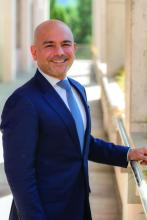Narrative medicine: Physician advocacy on the ground
Q: Not many doctors wear hats in medicine and filmmaking. Describe your journey as a filmmaker.
Dr. Esrailian: I’ve always been interested in storytelling. I was an English minor at Berkeley. My late mentor, Kirk Kerkorian, a legendary philanthropist, businessman, and entrepreneur, pushed me to take storytelling and do something that would potentially help secure Armenian Genocide recognition by the United States. Because of genocide denialists and geopolitical pressure, he felt the United States government was reluctant to recognize the Armenian Genocide. He thought having some visual materials for educational and outreach efforts would be transformational, and as it turns out, they were.
If you talk to any advocacy organization that tried for years to get Armenian Genocide recognition, they’d say that both films, “The Promise” (a feature film) and “Intent to Destroy” (a documentary), and the social impact media campaign we launched around them, were influential in moving the needle with legislators in the United States who, 3 years after “The Promise” was released, recognized the genocide. This was followed by the Library of Congress in 2020 and President Biden’s executive branch in 2021.
Q: What has been your most rewarding accomplishment?
Dr. Esrailian: Giving a voice to people who don’t have a voice is something that I’m proud of. Sometimes, it’s questionable what impact it may have because we still see atrocities committed all over the world. In September, Azerbaijan completed an ethnic cleansing campaign of Armenians from a region called Artsakh, officially the Republic of Nagorno-Karabakh.
Despite having so many relationships with powerful people in government and in high-profile media, and despite our documentaries, op-eds, and interactions with influential leaders on a regular basis, it always feels like it’s not enough. Obviously, the perpetrators are still able to abuse human rights and conduct these campaigns. Nevertheless, I don’t think we should be deterred. Allowing human rights violations to occur with impunity only emboldens perpetrators even more. It takes a long time to bring people to justice through international courts, but it does happen – eventually. That’s something I’m going to continue to work on.
Q: What should be the role of physicians in supporting human rights?
Dr. Esrailian: Physicians and health care providers play an important role in human rights. If you look back throughout history, whether it’s the International Committee of the Red Cross, or Doctors Without Borders, or other organizations, physicians and health care professionals are often on the front lines, helping people. Unfortunately, physicians have also been part of human rights violations, like the Holocaust or other genocides. But I do think that in this day and age, with the reputation that physicians have, we can be policy advocates and upstanders in addition to taking care of patients. Telling our stories to the world is important so that people know what’s actually happening on the ground.
Lightning round
Do you prefer texting or talking?
Talking
How many cups of coffee do you drink each day?
Two
What was the last movie you watched?
Mission Impossible
If you weren’t a gastroenterologist, what would you be?
Entrepreneur
Who inspires you?
My family








